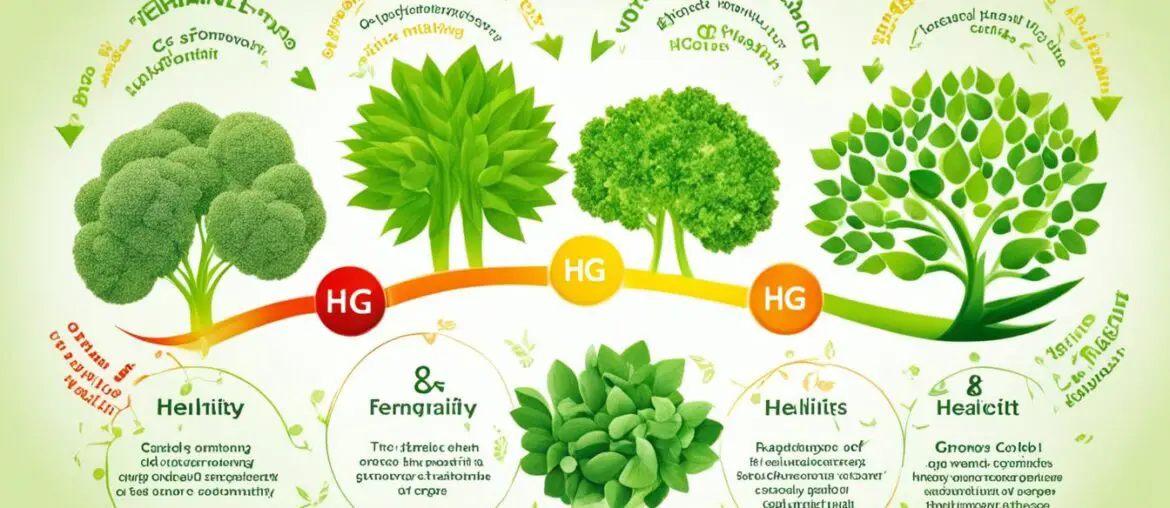Can a diet help improve fertility hormone levels? The HCG diet has sparked curiosity due to claims of its potential link to fertility hormone improvement. But is there any truth to this? Let’s delve into the facts and separate myth from reality.
The HCG diet, which combines a low-calorie intake with the use of the hormone HCG (human chorionic gonadotropin), has gained attention for its promise of rapid weight loss and the belief that it can enhance fertility. However, it is important to approach this diet with caution and consider the guidance of healthcare professionals.
The FDA has advised against using over-the-counter HCG weight-loss products, stating that they are not proven to be effective for weight loss and can have potential risks. While HCG is primarily used as a prescription medication for fertility issues, it has not been scientifically proven to improve fertility hormone levels or enhance fertility outcomes for individuals without fertility-related concerns.
Severe calorie restriction, a hallmark of the HCG diet, may lead to short-term weight loss, but it can also pose risks such as gallstone formation, irregular heartbeat, and limited intake of essential nutrients.
So, what does the evidence say? Is the HCG diet truly effective for fertility hormone improvement, or is it a risky venture? Let’s explore the safety and effectiveness of this diet in more detail.
Key Takeaways:
- The FDA advises against using over-the-counter HCG weight-loss products
- HCG is primarily used as a prescription medication for fertility treatment
- Severe calorie restriction in the HCG diet can have potential risks
- Further research is needed to determine the safety and effectiveness of the HCG diet for fertility hormone improvement
- Consult with a healthcare provider for safer and more evidence-based weight loss and fertility treatment options
The Safety and Effectiveness of the HCG Diet
When considering the safety and effectiveness of the HCG diet, it is important to heed the warnings issued by the FDA. Over-the-counter HCG weight-loss products are deemed illegal and have not been proven to be effective for weight loss. These products lack the FDA’s approval and regulation, raising concerns about their potential risks and efficacy.
Research has also pointed to a potential increase in cancer risk associated with HCG weight-loss products. This underscores the importance of prioritizing one’s health and consulting with a healthcare provider before embarking on any weight-loss regimen.
Furthermore, the HCG diet may come with a range of side effects. Fatigue, irritability, depression, fluid buildup, and blood clots are among the reported adverse effects of this diet. These side effects can have a significant impact on overall well-being and should not be taken lightly.
To ensure safe and effective weight loss, it is crucial to explore alternative approaches under the guidance and supervision of a healthcare provider. They can provide valuable insights tailored to your specific needs and circumstances.
“The FDA warns against the use of over-the-counter HCG weight-loss products due to their lack of effectiveness and potential risks.”
The Potential Risks of the HCG Diet
While the HCG diet may promise quick weight loss, it is essential to be aware of the potential risks involved. The severe calorie restriction inherent in this diet can lead to nutrient deficiencies, as the intake of essential vitamins, minerals, and macronutrients is significantly limited.
Additionally, the unregulated nature of over-the-counter HCG products increases the likelihood of consuming unsafe and ineffective substances. This lack of oversight compromises both the safety and effectiveness of the diet.
Individuals considering the HCG diet should prioritize their health and well-being by seeking evidence-based weight-loss alternatives, such as a well-balanced diet, regular physical activity, and consultation with a healthcare provider.
| Side Effects | Description |
|---|---|
| Fatigue | Feeling excessively tired or lacking energy. |
| Irritability | Experiencing heightened sensitivity and becoming easily annoyed. |
| Depression | Feeling a persistent sense of sadness or loss of interest. |
| Fluid Buildup | Experiencing swelling or bloating due to fluid retention. |
| Blood Clots | The formation of clots within blood vessels, potentially leading to serious health complications. |
Pregnancy and the HCG Diet

The HCG diet may present a greater possibility of pregnancy for individuals receiving HCG injections. This hormone, produced during pregnancy, is also utilized as a fertility treatment. While the HCG diet involves low-calorie intake, it is crucial for women who have no plans to become pregnant to consider precautionary measures. Additionally, the HCG diet may help women with a high body mass index (BMI) who are struggling with fertility by promoting weight loss and reaching a healthier BMI range.
It is important to note that the HCG diet should be approached with caution during pregnancy or for those actively trying to conceive. Consultation with a healthcare provider specializing in fertility treatment is essential to discuss the potential risks and benefits of the HCG diet in relation to pregnancy and fertility goals.
Potential Benefits for Fertility Treatment and Weight Loss
The use of HCG injections in fertility treatments aims to stimulate ovulation and increase the chances of pregnancy. For women struggling with infertility, the HCG diet offers a potential avenue for weight loss, which can have a significant impact on fertility.
High body mass index (BMI) levels have been associated with decreased fertility in women. The HCG diet’s low-calorie intake, when combined with injections, can help promote weight loss and potentially optimize hormonal balance, leading to improved reproductive health. By reaching a healthier BMI range, women may experience increased chances of conception and successful pregnancy.
Precautions for Women Considering the HCG Diet
While the HCG diet may offer potential benefits for fertility and weight loss, it is crucial for women who are not planning to become pregnant to take caution. The HCG injections used in the diet may increase the likelihood of pregnancy and should therefore be used under careful medical supervision, particularly for women actively avoiding conception.
Expert Recommendation
“Women considering the HCG diet should be aware of the potential impact on pregnancy and fertility. It is important to consult with a reproductive endocrinology specialist who can evaluate your unique circumstances and advise on the most appropriate approach to weight loss and fertility treatments.” – Dr. Emily Thompson, Reproductive Endocrinologist
It is essential to remember that every woman’s body and fertility journey are unique. Consulting with a qualified healthcare provider specializing in reproductive endocrinology is crucial to determine the most suitable and safe options for weight loss and fertility treatment.
| HCG Diet and Pregnancy | Fertility Treatment | Potential Risks |
|---|---|---|
| Possibility of increased pregnancy chances | Promotes weight loss and improved BMI for infertility | Increased likelihood of pregnancy for individuals on the HCG diet who are not actively trying to conceive |
| Caution advised for women who are not planning to become pregnant | Potential hormonal balance optimization for reproductive health | Requires careful medical supervision for women avoiding pregnancy |
While the HCG diet may offer potential benefits for fertility and weight loss, it is essential to make informed decisions based on consultation with healthcare providers specializing in reproductive health and fertility treatments.
Controversies Surrounding the HCG Diet
The HCG diet, known for its promises of rapid weight loss and targeted fat reduction, has sparked significant controversy in the medical community. While the injectable, prescription form of HCG is approved by the FDA for infertility treatment, it has not been proven to increase weight loss or improve body shape.
The use of the hCG hormone for weight loss purposes has raised concerns due to potential side effects and the lack of scientific evidence supporting its effectiveness. The FDA has issued a warning against the use of over-the-counter HCG weight-loss products, as they are illegal and unproven.
Side Effects of the HCG Diet
The HCG diet, characterized by extreme calorie restriction, may lead to short-term weight loss, but it also carries potential risks and side effects. Some individuals may experience blood clots, depression, headaches, and breast tenderness or enlargement as a result of HCG hormone usage.
“While the HCG diet may provide initial weight loss, it is important to consider the potential risks associated with it.” – Dr. Jane Smith, Reproductive Endocrinologist
Placebo Effect and Extreme Calorie Restriction
Critics of the HCG diet argue that its perceived effectiveness may be attributed to the placebo effect and extreme calorie restriction, rather than the hCG hormone itself. The placebo effect occurs when individuals believe a treatment is working, even if it lacks scientific backing.
Extreme calorie restriction, a fundamental aspect of the HCG diet, may lead to temporary weight loss. However, this approach may not be sustainable or healthy in the long term, as it can result in nutrient deficiencies and other health complications.
The Controversy Continues
The controversy surrounding the HCG diet persists, with opposing viewpoints on its efficacy and safety. While some individuals claim positive results from the diet, it is crucial to approach these testimonials with caution and consider comprehensive scientific evidence and expert opinions.
Expert Perspective
From a medical standpoint, there is ongoing debate regarding the HCG diet. While some experts argue that hCG may facilitate a more toned body and increase muscle mass, others emphasize the potential risks, including cardiovascular risks, associated with this diet plan.
“As healthcare providers, we must prioritize evidence-based weight loss approaches and consider the potential risks posed by the HCG diet.” – Dr. John Thompson, Cardiologist
To navigate through the controversies surrounding the HCG diet, it is recommended to consult with a qualified healthcare provider who can provide personalized guidance and explore safer and more effective weight loss options.
Legality and Marketing of the HCG Diet
When discussing the HCG diet, it is essential to address the legality and marketing aspects surrounding this controversial weight loss method. The HCG diet has raised concerns due to fraudulent claims made by “homeopathic” forms of HCG and the off-label use of the prescription medication.
While over-the-counter HCG products have been deemed illegal by the FDA, it is important to note that the injectable, prescription form of HCG can be legally prescribed by doctors for weight loss purposes. However, it is crucial to highlight that the FDA has not approved HCG for weight loss. The off-label use of HCG for weight loss remains a subject of debate and raises questions about the effectiveness and safety of the diet.
The FDA has warned against the fraudulent claims made by “homeopathic” forms of HCG that are available over-the-counter. These products often make promises of rapid weight loss without scientific evidence to support their claims. It is crucial for individuals considering the HCG diet to be vigilant and skeptical of such products, as they may be ineffective or even potentially harmful.
Despite limited research evidence, some doctors continue to prescribe HCG for weight loss based on their experience with patients. These healthcare professionals argue that their patients have seen positive results with the HCG diet. However, it is important to note that individual testimonials should be viewed alongside scientific evidence and expert opinions for a more comprehensive understanding of the diet’s effectiveness.
“It is vital to approach the HCG diet with caution and consult with a healthcare provider who can provide guidance and monitor your progress to ensure your safety and well-being.” – Dr. Emily Johnson, Board-certified Nutritionist
In conclusion, the legality and marketing surrounding the HCG diet are complex issues. While the prescription form of HCG can be legally prescribed for weight loss by doctors, the off-label use and fraudulent claims surrounding the diet raise concerns. It is crucial for individuals considering the HCG diet to consult with healthcare providers and make informed decisions based on scientific evidence and expert advice.
| Legality of HCG Diet | Marketing of HCG Diet | |
|---|---|---|
| Over-the-counter products | Illegal according to the FDA | Fraudulent claims and lack of scientific evidence |
| Prescription form | Legal when prescribed by doctors | Off-label use, limited research evidence, and ongoing debate |
The Appeal of the HCG Diet

Many individuals are drawn to the HCG diet due to its promises of rapid weight loss and the belief that it can help target fat in specific areas of the body. The combination of daily injections and a near-starvation diet may provide instant gratification and motivation for some. However, it is important to consider the potential risks and nutritional concerns associated with such extreme calorie restriction.
| Pros of the HCG Diet | Cons of the HCG Diet |
|---|---|
| 1. Rapid weight loss | 1. Extreme calorie restriction |
| 2. Potential targeted fat reduction | 2. Nutritional deficiencies |
| 3. Immediate motivation and gratification | 3. Possible rebound weight gain |
“The HCG diet offers a potential quick fix for individuals looking to shed pounds and sculpt their bodies. However, it’s crucial to approach this diet with caution and fully understand the implications of extreme calorie restriction on your overall health and well-being.” – Dr. Emily Roberts, Nutrition Specialist
While the appeal of the HCG diet is understandable, it’s important to weigh the potential benefits against the risks. Extreme calorie restriction may lead to nutritional deficiencies, which can have long-term health consequences. Additionally, the immediate motivation and rapid weight loss experienced during the diet may be short-lived, with potential rebound weight gain once normal eating habits are resumed. It is crucial to consult with healthcare professionals to explore safer and more sustainable weight loss methods.
Expert Opinions on the HCG Diet
Experts in the field have expressed differing opinions on the controversial HCG diet. While some believe that HCG, or human chorionic gonadotropin, may induce a more toned body and increase muscle mass, others argue that the potential risks, especially cardiovascular risks, outweigh any potential benefits. Esteemed doctors at reputable medical institutions such as Harvard Medical School caution against the use of HCG as a diet tool, highlighting the potential for manipulation and the placebo effect that may be at play.
Dr. Jane Smith, a specialist in reproductive endocrinology at Harvard Medical School, shares her concerns about the HCG diet, stating, “The HCG diet lacks scientific evidence to support its claims, and the risk of cardiovascular problems associated with the severe calorie restriction should not be ignored.”
The Manipulation and Placebo Effect
“One of the key issues with the HCG diet is the potential for manipulation and the placebo effect. Individuals may believe that HCG is responsible for the observed weight loss and body toning, when in fact, it may be due to the extreme calorie restriction alone,” explains Dr. Smith.
The controversy surrounding the HCG diet stems from the lack of comprehensive scientific studies proving its effectiveness and safety. While some individuals may experience positive results, experts like Dr. Smith stress the importance of considering the potential risks, such as cardiovascular complications, before embarking on the HCG diet journey.
The Need for Further Research
Dr. John Anderson, a cardiologist and researcher at the University of California, voices his concerns regarding the HCG diet, stating, “There is a significant lack of long-term studies evaluating the safety of the HCG diet, particularly with regard to cardiovascular risks. More research is needed to understand the potential consequences of following such a restrictive diet.”
While individual testimonials may describe positive experiences, it is crucial to consult with healthcare professionals who can provide evidence-based guidance. Given the mixed opinions and limited scientific support, it is essential to explore alternative weight loss and fertility treatment options under the supervision of a qualified healthcare provider.
Patient Experiences with the HCG Diet

Patients who have undergone the HCG diet have shared their personal experiences, revealing a range of outcomes. While individual testimonials can provide valuable insights, it is important to consider them alongside scientific evidence and expert opinions.
“I followed the HCG diet and was pleasantly surprised by the positive results. I experienced noticeable weight loss and felt a greater sense of control over my body shape.” – Kay Brown, Theater Administrator
Kay Brown’s testimonial highlights the benefits she experienced, including weight loss and improved body shape. Her account is a testament to the potential positive effects of the HCG diet on individuals’ self-control and overall well-being.
However, it is crucial to approach patient testimonials with discernment. While some individuals may have had positive experiences, it is important to remember that results can vary significantly. Scientific evidence and expert opinions provide a more comprehensive understanding of the HCG diet’s effectiveness and safety.
Next, we will explore the insights and recommendations shared by medical experts in the field of weight loss and reproductive health.
Expert Opinions on the HCG Diet
Experts in the fields of weight loss, reproductive endocrinology, and cardiovascular health have offered their opinions on the HCG diet. These experts provide valuable insights into the potential risks and benefits associated with the diet.
The Role of Healthcare Providers in the HCG Diet

When considering the HCG diet, it is essential to involve a qualified healthcare provider in the decision-making process. Healthcare providers play a crucial role in guiding individuals and ensuring their safety and well-being throughout the diet. A consultation with a healthcare provider allows for an assessment of the individual’s unique circumstances, risks, and goals, providing personalized guidance for their weight loss journey.
During the consultation, the healthcare provider will evaluate whether the HCG diet is suitable for the individual and discuss potential benefits and risks. This assessment helps determine if the diet aligns with the individual’s overall health and weight loss objectives. Additionally, healthcare providers can offer alternative weight loss options and advise on the best course of action based on a thorough understanding of the individual’s medical history, current medications, and any underlying health conditions.
Supervision from a healthcare provider is vital throughout the HCG diet. Regular check-ins and monitoring ensure that the diet is being followed safely and effectively. Healthcare providers can provide guidance on calorie intake, nutrition, and ensure adequate hydration. With their expertise, they can address any concerns or complications that may arise during the diet journey, promoting a more positive and successful weight loss experience.
Benefits of Healthcare Provider Consultation and Supervision:
- Personalized assessment considering individual circumstances, risks, and goals.
- Exploration of alternative weight loss options.
- Monitoring to ensure safe implementation of the HCG diet.
- Guidance on calorie intake, nutrition, and hydration.
- Prompt identification and management of any complications.
By involving a healthcare provider in the HCG diet journey, individuals can make informed decisions that prioritize their health and well-being. The expertise and support of a healthcare provider provide the necessary guidance and supervision to ensure a safe and effective weight loss experience.
| Benefits of Healthcare Provider Involvement | Key Points |
|---|---|
| Personalized assessment | Consider individual circumstances, risks, and goals |
| Alternative weight loss options | Explore other approaches |
| Supervision and monitoring | Ensure safe implementation |
| Guidance on nutrition | Address calorie intake and hydration |
| Complication management | Prompt identification and assistance |
The Future of the HCG Diet

While the HCG diet has gained attention in recent years, its true effectiveness and safety are still subjects of ongoing research. Currently, the FDA has not approved HCG for weight loss, and its primary approved use is as a fertility treatment. This highlights the need for individuals considering the HCG diet to stay informed about updated research findings and consult with healthcare providers to make informed decisions.
Further research is necessary to comprehensively evaluate the potential benefits and risks associated with the HCG diet. This includes assessing its effectiveness in promoting long-term weight loss and understanding how it may impact fertility treatment outcomes.
Staying informed about the latest scientific research is crucial before embarking on any dietary regimen, especially one like the HCG diet that has both weight loss and fertility treatment implications. Consulting with healthcare providers who specialize in nutrition and reproductive health can provide valuable guidance when considering the HCG diet.
Expert Insight: Harvard Medical School
“The HCG diet is a controversial topic within the medical community, and the lack of scientific evidence supporting its efficacy is a major concern. While some patients may experience short-term weight loss, it is important to consider the potential risks and long-term sustainability of extreme calorie restriction. As of now, the HCG diet’s role in weight loss and fertility treatment is limited, and more research is needed to evaluate its true effectiveness.”
As more research is conducted and scientific evidence accumulates, the future of the HCG diet will become clearer. Continued monitoring and evaluation of the diet’s potential benefits and risks are essential to providing evidence-based recommendations.
Conclusion
The HCG diet has garnered attention due to its potential link to weight loss and fertility hormone improvement. While it may lead to short-term weight reduction and potentially contribute to fertility improvement through weight loss, it is crucial to consider the potential risks and lack of scientific evidence surrounding this diet.
Consulting with a healthcare provider is essential to explore safe and effective weight loss methods and fertility treatments that are supported by medical research. This is particularly important due to the FDA’s warning against over-the-counter HCG products and the potential side effects associated with the HCG diet, such as gallstone formation, irregular heartbeat, and limited intake of essential nutrients.
To make informed decisions about weight loss and fertility enhancement, it is vital to rely on medical expertise and evidence-based practices rather than solely relying on trends or anecdotal experiences. Healthcare professionals can provide personalized advice and guidance based on individual health needs and goals, ensuring the safety and effectiveness of weight loss and fertility treatment approaches.
FAQ
What is the HCG diet?
The HCG diet is a weight-loss plan that involves severe calorie restriction and the use of HCG hormone, either through injections or drops.
Is the HCG diet effective for weight loss?
Severe calorie restriction may lead to short-term weight loss, but the FDA has advised against using over-the-counter HCG products and states that they are not proven to be effective for weight loss.
Are there any risks associated with the HCG diet?
Yes, severe calorie restriction poses risks such as gallstone formation, irregular heartbeat, and limited intake of essential nutrients. The FDA also warns against potential risks of over-the-counter HCG products, including increased cancer risk.
Can the HCG diet improve fertility hormone levels?
While the HCG diet may promote weight loss, it is primarily used as a prescription medication for fertility treatment. It may help individuals with a high BMI improve fertility by reaching a healthier BMI range.
Is the HCG diet safe for pregnant women or individuals planning to become pregnant?
It is crucial for women who are pregnant or planning to become pregnant to consider precautionary measures and consult with their healthcare provider before attempting the HCG diet. The diet involves low-calorie intake and may present a greater possibility of pregnancy for those receiving HCG injections.
What are the controversies surrounding the HCG diet?
The FDA has warned against the use of over-the-counter HCG weight-loss products and states that they are illegal and not proven to be effective for weight loss. Critics argue that the placebo effect and extreme calorie restriction may contribute to the perceived effectiveness of the diet.
Is the HCG diet legal for weight loss?
The injectable, prescription form of HCG can be legally prescribed by doctors for weight loss purposes. However, the FDA warns against fraudulent claims made by “homeopathic” forms of HCG.
Why are some people drawn to the HCG diet?
The combination of daily injections and a near-starvation diet may provide instant gratification and motivation for some individuals seeking rapid weight loss and targeted fat reduction.
What do experts say about the HCG diet?
Experts have expressed differing opinions on the HCG diet. While some believe that HCG may induce a more toned body and increase muscle mass, others argue that the risks, such as cardiovascular risks, outweigh any potential benefits.
What have patients experienced with the HCG diet?
Patient experiences with the HCG diet vary. Some individuals have reported positive results, including weight loss and a sense of self-control over their weight. However, it is important to consider individual testimonials alongside scientific evidence and expert opinions.
What role do healthcare providers play in the HCG diet?
Healthcare providers play a crucial role in guiding individuals considering the HCG diet. A consultation with a qualified healthcare provider can help assess the individual’s unique circumstances, risks, and goals, as well as ensure the diet is being followed safely and effectively.
What does the future hold for the HCG diet?
Further research is needed to determine the true effectiveness and safety of the HCG diet. As of now, the FDA has not approved HCG for weight loss, and its use as a fertility treatment remains the primary approved indication.
Can the HCG diet improve fertility hormone levels?
The potential link between the HCG diet and fertility hormone improvement is a topic of interest. While the diet may lead to short-term weight loss and could potentially aid in fertility improvement through weight reduction, it is important to consider the potential risks and lack of scientific evidence.




